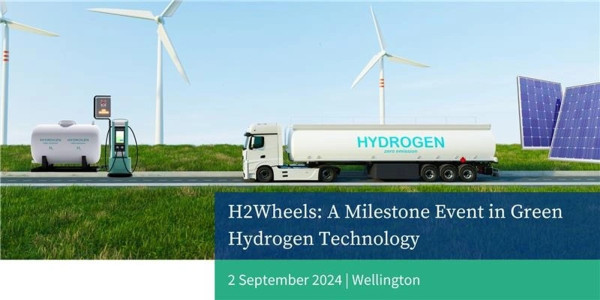Showcasing New Zealand’s progress on hydrogen at H2 Wheels
Standards New Zealand’s Principal Project Manager Chris Forsman presented on the work to date in laying the foundations for safety using international standards across New Zealand’s emerging hydrogen infrastructure and regulation at the H2 Wheels conference in Te Papa, Wellington on 2 September.
For potential international investment
Hosted by the German-New Zealand Chamber of Commerce and supported by the German Federal Ministry of Economy and Climate Change, the conference aimed to strengthen and support the economic relationship between Germany and New Zealand. Hydrogen represents one such area of potential significant foreign investment with Germany at the forefront of the green energy revolution due to billions of euros invested by their government.
The event delved into key areas of hydrogen application, from enhancing the hydrogen refuelling infrastructure to exploring its potential in industrial processes, marine transport, and energy storage.
Renewable energy sets New Zealand apart
New Zealand's existing and extensive renewable energy generation (around 87%) means we are well set to support a transition to green hydrogen production as our existing energy infrastructure brings down costs and allows for economies of scale. Green hydrogen is generated through renewable energy like wind, hydro, geothermal and solar meaning it’s not just the end product that is emissions-free but fewer emissions are created through its production.
Hydrogen as a renewable and sustainable energy vector, doesn’t just bring environmental benefits in helping New Zealand meet emissions reduction targets by 2050, it also offers potential for economic development and foreign investment worth hundreds of millions of dollars.
Monique Surges, Chief Executive Officer of the German-New Zealand Chamber of Commerce says, ‘By combining German engineering expertise with the Kiwi can-do attitude, we aim to position New Zealand as a leading example in the transition to a hydrogen-powered economy.’
Significant strides for H2
Government-initiated work on hydrogen within New Zealand, particularly through the Ministry of Business, Innovation and Employment (MBIE), has been happening for several years with the roadmap included in the first Emissions Reduction Plan in 2022. Tens of millions of dollars of private and public funding, has already been invested in diverse projects to date. You can learn more about these through MBIE:
Hydrogen projects in Aotearoa New Zealand(external link)
The suite of standards identified and adopted for use in New Zealand will support the safety and interoperability requirements for regulatory settings, enable market-led private and foreign investment into hydrogen, and reduce consenting barriers.
Explaining the hydrogen framework
At the conference Standards New Zealand’s Chris Forsman explained the Hydrogen standards review, commissioned by WorkSafe New Zealand – Energy Safety, with expertise from New Zealand Hydrogen Council members and the three-stage standards implementation strategy, that resulted in the adoption of thirteen international standards in July 2024
Chris Forsman explained, ‘The ecosystem that these standards touch on is complicated, cutting across six ministerial portfolios, and yet we are making good progress. The prioritisation plan began with a look at the supply chain and concentrating efforts across three fundamental stages: stationary energy and storage near renewable energy sources, semi-centralised hydrogen distribution using heavy vehicles, and decentralised distribution. This extends to enabling the blending hydrogen, along with biomethane into the existing reticulated national gas network.
‘From here a further ten international ISO and IEC safety standards are expected to be modified to suit domestic needs and adopted for integration into regulation. Improvements to the way these standards are recognised in regulation is currently going through a parliamentary review process.’
Leading with international standards
Standards New Zealand National Manager Malcolm MacMillan says, ‘While standards may sometimes hide behind the scenes to the public, they play a fundamental role in this renewable energy transition for New Zealand, helping it gain pace whilst maintaining safety and quality. Having standards in place means industry can press on with direction, guidance, and confidence on how to adapt and develop the necessary infrastructure and distribution and consumption systems, whilst mitigating the risks.
‘Standards also offer assurance to foreign investors that things are being done right. As a small nation New Zealand often follows behind other nations with large scale changes. When it comes to hydrogen, and working with leading hydrogen users like Japan, Singapore, and Germany we have potential to lead and be a forerunner of large-scale hydrogen use. That will be impactful for all New Zealanders, when one day we’re not just using hydrogen in our homes and vehicles but as a manufacturer we’re exporting it across the world too.’

